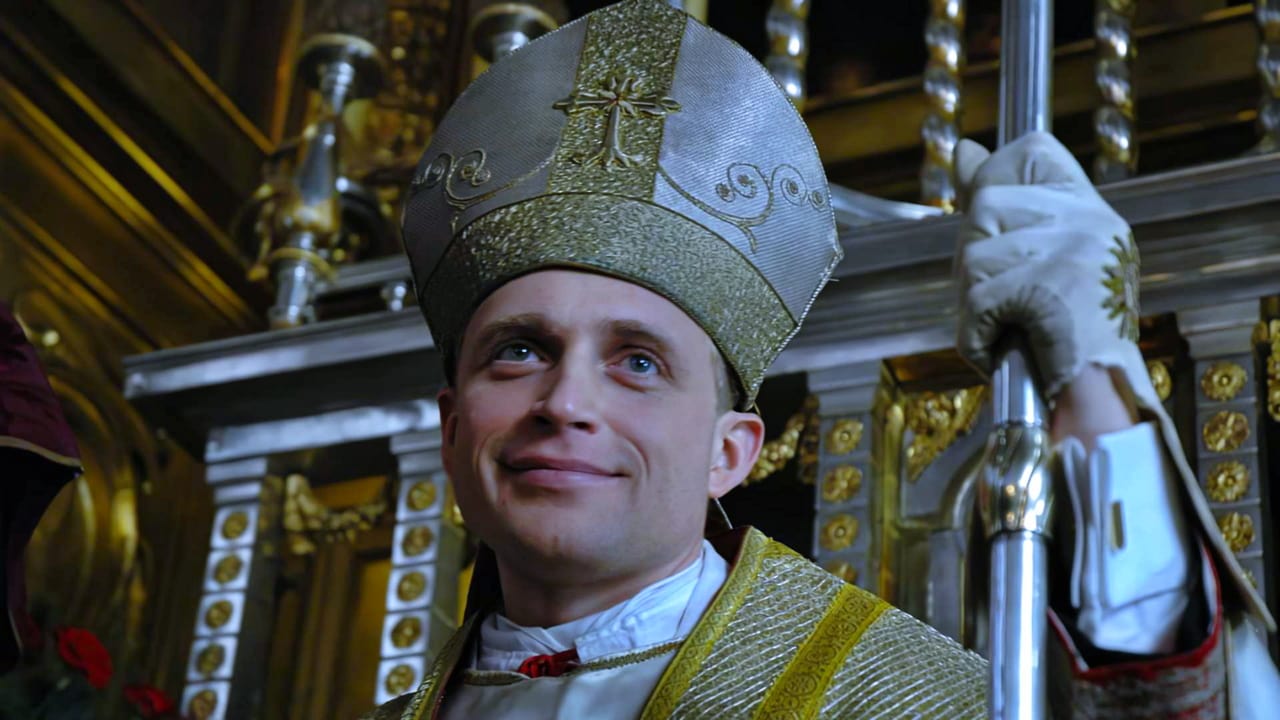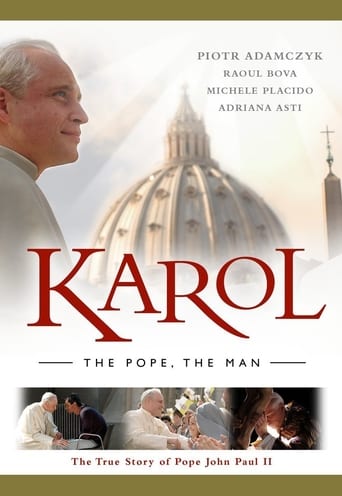

This is a very good film, or, mini series, of almost 3 hours duration. The historical background of Krakow occupation and Jews' sufferings is shown very well, and the Nazi atrocities are not muted or bypassed here. The main role is played by Pyotr Adamczyk and he did a great job as a the young Karol, and then a mature cardinal, and then, a Pope. There are some weaker parts, though. Of course, such a long story requires a longer film, which could make it almost impossible, but to press into so much in a 3 hour spell is a bit hastened. Then, there are certainly some weaker parts of some actors and come on, there are some obvious caricature-quality Communist figures shown almost like clowns or mere idiots. Saying that, I must admit, that this film is 1000 times better than the 2006 sequel, which is a real bore. This one is vivid, brisk, dynamic and often very very elegant work. Great film, yes, but still, for John Paul II's fans
... View MoreThe film concerns about the majestic figure , the Polish Pope Karol Wojtyla (Piotr Adamczyk ) brought to the life at much expense and with sense and thought since his youth in Poland , the early years , until his appointment as Pope of the Catholic church in Rome (1978). The movie starts on October 12 , 1939 when the evil men Nazis get taken the world , Nazis have invaded Poland , they've destroyed the Polish air forcé , 500 plane pulverised before they could take off , bombed cities , radio station , Churchs... Meanwhile Karol looks after his father but he wants to join the Army . They flee but the Russians have invaded the border . Hitler and Stalin made a pact , the Red army has betrayed to Poland and now they don't take prisoners . Hitler appointed Hans Frank (excellently played by Matt Craven) chief civilian officer for occupied Polish territory and then Governor-General of occupied Poland . Hans Frank described his policy in this post : ¨Poland shall be treated like a colony : the Poles will become the slaves of the Greater German Empire¨ . He destroyed Poland as a national entity and exploited its human and material resources for the German war effort . Frank ran Poland in imitation of the Nazi state . He ordered the killing of Polish Intelligence (represented by the professor played by Kenneth Welsh) and Military officials in an attack of destruction and hatred against the Polish universities and the Catholic Church . Frank warned that Jews and Poles could be sentenced to death for any act of force against the German or for damage to a public installation , he confiscated Jewish and Polish property , he expropriated valuable paintings for his own house and he allowed huge quantities of food to be smuggled from Poland to Germany . At a time when most Europe was hungry , Frank set an elaborate table at the Governor's palace in Cracow (as happens in the film when is invited the priest well played by Raoul Bova) . By December 1942 more than 95 percent of the Jews in Poland had been transported to extermination camps . The future Pope must confront these adversities and misfortunes , he suffers cruel experiences but the God's faith and the love is the cure for the badness . Then he assisted the holiness call and goes into the seminar and as priest he serves his first mass . After that , he's appointed bishop and Cardinal and continuing consoling the mankind , renovating the moral sense and thoughts ,giving hope and fighting for human rights . Later on , he was elected Pope , the first no Italian from 1523.The film captures splendidly the goodness and generosity of the immortal Pope well played by Piotr Adamczyk . When John Paul II returned to Poland for the first time after his election seven year old Adamczyk was in the crowd . It's followed by a sequel (2006) by similar actors and director , dealt with his fruitful pontiff (1978-2005) and the pastoral journeys he made to America , Mexico and many other countries , making an intense diplomatic labour and problems that were taking place in the Catholic church , including the 1981 attack by Ali Agca . The motion picture was magnificently played by an excellent plethora of actors . Special mention to touching , evocative musical score by the classic Ennio Morricone . The picture was finely directed by Giacomo Battiato , a specialist on accurate biopic , as he directed autobiography stories about Giovane Casanova , Benvenuto Cellini and Stradivari.
... View MoreWOW!! Um.... I can't say it any better than that. If possible, I would have given it a 20 out of eleven because it was that well done. No extreme graphics or technological advances or anything like that, just incredible accuracy and acting. I would rate it up among the movies such as Lord of the Rings I, II, and III, Chronicles of Narnia, and other such epics. Though it is not about a warrior, it is about Karol Woytowich, who had the heart of a warrior and the restraint and love of Christ. Like with the movies I ranked it with, you feel the passion of the main character and those around him. In a day of digital effects making or breaking a movie, it was great to see a movie that didn't need them. There is a clear message displayed not through merely words, but through action of the characters as you watch their experiences unfold. You are able to unlock the mysteries of the deep, profound, and personal faith of Karol as you watch this movie, understanding what made him so great. I would recommend it for all.
... View MoreSoon after the death of the beloved Pope John Paul II, the movie by Giacomo Battiato was released on the Italian TV in two parts. Poland, however, was the exception. The distributors decided to release the movie in cinemas on June, the 17th. Battiato's film has been enthusiastically accepted by the majority of viewers, not only as the biographical work, but as a profound insight into the times which Karol Wojtyla experienced. Although it contains some simplifications and changes, the movie, based on the book by Gianfranco Svidercorschi, aims at emphasizing the phenomenon of Wojtyla's personality together with the times he grew in rather than presenting sheer biographical facts.CONTENT: Krakow, September 1939, the German army invade the city under the leadership of Nazi general Hans Frank (Matt Craven). From the beginning, their politics is destructive towards everything that is Polish, the culture and the whole Polish Nation. The attack of hatred and destruction is directed towards elites of Polish universities, particularly, Professors at Jagiellonian University, and the Church. Young Karol experiences these events very cruelly, the suffering of his Nation is his suffering. His plans to study Polish philology and literature, to become an actor are ruined, his dearest friends (including the Jewish Family Kluger) are taken to Holocaust or killed on the way. The world seems to have turned into sheer bestial madness. But Karol's escape are books and prayer. With some of his friends, including Hania (Malgorzata Bela), they decide to retain the Polish culture meeting secretly and cultivating their love to the theater. They strengthen their faith that the only cure for the hatred in the world is love. It is then that Karol decides to be a priest and serve God. He goes to the seminar after which he serves his First Holy Mass on November, the 2nd, 1946. But the cruel experience of WWII does not end. After WWII, Poland experiences another pressure of the totalitarian reign, this time it is communism, illusively directed towards the goodness of people and openly against the Church. Karol as a young priest, later bishop and cardinal, never gives up defending human rights, heading for the real goodness of the society, and consoling people, sowing hope whenever possible. The movie shows two most important events: Poznan (1956) and Nowa Huta (1977). This experience which started with the trials of his Nation leads him to Rome, to the memorable 16th of October 1978 when the whole world hears the news: Habemus Papam... Cardinalem Wojtyla (the archive final shot of the movie).CHARACTERS: There are very interesting characters showed in Battiato's film. It is noble prof. Wojcik (Kenneth Welsh) who does not lose faith in free Poland. He represents the real power - the power of thought that is a better weapon than any other. The most memorable scene concerning this character is when prof Wojcik speaks to Frank: "Can't you see there is no longer any life in you?!" Another well developed character is Adam (Ken Duken), who is first a spy against Wojtyla, but later realizes what the truth is: the one that is offered by the communists or the one by the Catholic Church? The accurate representation of some fictitious characters in KAROL appears to be similar as in another movie about Karol Wojtyla, FROM A FAR COUNTRY (1981) by Krzysztof Zanussi.CAST AND MUSIC: The movie, except for the wonderful content and characters that it entails, is well made artistically. The cast that are in the movie give fine performances. Piotr Adamczyk is a perfect choice for Karol Wojtyla, he deeply feels the role trying to make the portrayal as authentic as possible. Moreover, he looks pretty similar. Raoul Bova as priest Tomasz Zaleski gives his most memorable performance in the scene of his visit to general Frank. His speech about the Jewish children makes an effect in the viewer and is, indeed, very well played. Except for other cast, I particularly liked the performances of: Matt Craven as Frank - he seems to portray a man deprived of any human feelings; a famous Bulgarian actor, Hristo Shopov who portrays a fanatic cruel communist Julian Kordek; and the fictitious role of Hania performed by a beautiful model, Malgosia Bela. As far as the crew is concerned, it is significant to mention famous Ennio Morricone who wrote music to this film.MESSAGE: If someone asked me what this film is trying to convey, I would probably answer that its message is identical with what Karol Wojtyla was saying throughout his life - Cure everything through love and forgiveness. It is a very Christian message that John Paul II learned from Christ and the Immaculate Heart of Virgin Mary during his whole life. It is especially noticeable in the moment when he speaks to the young people: of course you are free to take the gun and fight them (the communists), but I advise you to promote the civilization of love. That is also the thing that he said to the youth during the Jubilee of 2000: "I see in you, dear young friends, the protectors of the Third Morning" In spite of some minor mistakes of this movie (some important people are skipped, including archbishop Adam Stefan Sapieha), it is worth seeing to get to know the magnificent person that John Paul II was, how he grew to sanctity (that is how a lot of people see him now).This movie will lead you to precious reflections on your life, similarly like almost each word said by the dear late Holy Father John Paul II. At the end of my long review, I will quote the words of archbishop Stanislav Dziwisz, John Paul II's lifelong friend and companion. These words came to my mind throughout the whole movie:"John Paul the Second! Thank you that you were with us! John Paul the Great! Thank you that you are with us! John Paul the Saint! Pray for us!"
... View More